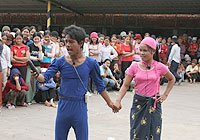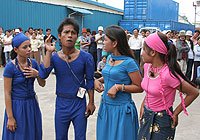 Actors in Cambodia perform a skit about the dangers of HIV/AIDS before a crowd of garment factory workers on their lunch break. (Photo by Steve Nettleton, UNICEF Cambodia)
Actors in Cambodia perform a skit about the dangers of HIV/AIDS before a crowd of garment factory workers on their lunch break. (Photo by Steve Nettleton, UNICEF Cambodia) Cambodian garment workers, like those watching the performers shown here, are mostly young women – a vulnerable group with regard to sexual abuse and the spread of HIV. (Photo: UNICEF Cambodia)
Cambodian garment workers, like those watching the performers shown here, are mostly young women – a vulnerable group with regard to sexual abuse and the spread of HIV. (Photo: UNICEF Cambodia)PHNOM PENH, Cambodia, 3 August 2006 – Two actors in heavy make-up swagger drunkenly across the lot of a garment factory in Phnom Penh. Their antics draw raucous laughter from a growing crowd of young women who are taking a lunch break.
On the surface, it seems nothing more than a bit of burlesque. The two men dance and bumble about the lot, sipping from water bottles and hurling slurred insults at other characters.
Behind the silly costumes, however, it becomes apparent this is not a comedy. It is a story about domestic violence and about the deadly risk of HIV and AIDS.
Educating through drama
The actors belong to a street theatre troupe that performs this drama regularly before workers at dozens of factories across the Cambodian capital. The troupe is sponsored by Marie Stopes International, Australia, and aligned with a UNICEF-supported effort to raise HIV/AIDS awareness.
The audiences are mostly young women, the main workforce of Cambodia’s garment industry. According to the Asian Development Bank, 85 to 90 per cent of Cambodia’s 270,000 garment workers are women between the ages of 18 and 25. These women form a social group that is very vulnerable to abuse and the spread of HIV.
“Most of the factory workers come from the countryside, and they have a low level of education,” said Cambodian Women’s Development Association staff member Noun Sophet. “They are isolated from their families, with few people they can turn to.”
While the drama keeps workers entertained outside, another group of employees gathers inside the factory for an intensive training session about pregnancy and sexually transmitted diseases. These women will become peer educators, taking what they’ve learned and teaching it to friends and colleagues.
Saen Yina, 21, is particularly interested in knowing more about reproductive health. She is from Phnom Penh and already has a young child.
“It’s important, as a young mother, to know more about this,” she said. “I want to share what I learn here with my friends.”
A new dialogue on HIV/AIDS
As in many countries, open talk of HIV and AIDS is rare here. Schools and some workplaces now teach awareness and prevention. But many Cambodians are reluctant to ask questions about the illness.
A nationwide HIV/AIDS hotline hopes to change that. The service, run by the Inthanou Association, a non-governmental organization, is the only one of its kind in the country. With support from UNICEF and Cambodia’s leading mobile telephone company, the lines are open six days a week, providing callers with advice and encouragement.
Operators receive more than 200 calls a day, the vast majority of them from young people between the ages of 15 and 24, according to the Inthanou Association’s Director, Dr. Loun Monyl. “The hotline is anonymous and confidential, so they feel free and can talk openly about their behaviour,” said Dr. Monyl.
Inthanou plans to modernize and expand the service over the next year, setting up a call centre that can accommodate more lines.
Along with the dramas and workshops, the hotline opens a new channel of dialogue for Cambodians to dispel misunderstanding and protect themselves and others from the dangers of HIV and AIDS. These goals are in keeping with the objectives of UNITE FOR CHILDREN UNITE AGAINST AIDS, the global campaign launched by UNICEF and its partners in October 2005 to address the impact of the pandemic on young people.
On the surface, it seems nothing more than a bit of burlesque. The two men dance and bumble about the lot, sipping from water bottles and hurling slurred insults at other characters.
Behind the silly costumes, however, it becomes apparent this is not a comedy. It is a story about domestic violence and about the deadly risk of HIV and AIDS.
Educating through drama
The actors belong to a street theatre troupe that performs this drama regularly before workers at dozens of factories across the Cambodian capital. The troupe is sponsored by Marie Stopes International, Australia, and aligned with a UNICEF-supported effort to raise HIV/AIDS awareness.
The audiences are mostly young women, the main workforce of Cambodia’s garment industry. According to the Asian Development Bank, 85 to 90 per cent of Cambodia’s 270,000 garment workers are women between the ages of 18 and 25. These women form a social group that is very vulnerable to abuse and the spread of HIV.
“Most of the factory workers come from the countryside, and they have a low level of education,” said Cambodian Women’s Development Association staff member Noun Sophet. “They are isolated from their families, with few people they can turn to.”
While the drama keeps workers entertained outside, another group of employees gathers inside the factory for an intensive training session about pregnancy and sexually transmitted diseases. These women will become peer educators, taking what they’ve learned and teaching it to friends and colleagues.
Saen Yina, 21, is particularly interested in knowing more about reproductive health. She is from Phnom Penh and already has a young child.
“It’s important, as a young mother, to know more about this,” she said. “I want to share what I learn here with my friends.”
A new dialogue on HIV/AIDS
As in many countries, open talk of HIV and AIDS is rare here. Schools and some workplaces now teach awareness and prevention. But many Cambodians are reluctant to ask questions about the illness.
A nationwide HIV/AIDS hotline hopes to change that. The service, run by the Inthanou Association, a non-governmental organization, is the only one of its kind in the country. With support from UNICEF and Cambodia’s leading mobile telephone company, the lines are open six days a week, providing callers with advice and encouragement.
Operators receive more than 200 calls a day, the vast majority of them from young people between the ages of 15 and 24, according to the Inthanou Association’s Director, Dr. Loun Monyl. “The hotline is anonymous and confidential, so they feel free and can talk openly about their behaviour,” said Dr. Monyl.
Inthanou plans to modernize and expand the service over the next year, setting up a call centre that can accommodate more lines.
Along with the dramas and workshops, the hotline opens a new channel of dialogue for Cambodians to dispel misunderstanding and protect themselves and others from the dangers of HIV and AIDS. These goals are in keeping with the objectives of UNITE FOR CHILDREN UNITE AGAINST AIDS, the global campaign launched by UNICEF and its partners in October 2005 to address the impact of the pandemic on young people.

























No comments:
Post a Comment